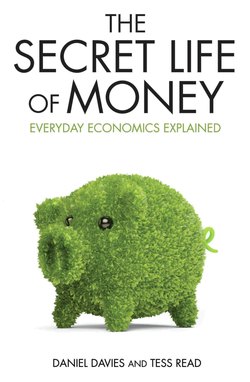Читать книгу Secret Life of Money - Everyday Economics Explained - Daniel Davies - Страница 4
На сайте Литреса книга снята с продажи.
ОглавлениеINTRODUCTION
THE SECRETS OF MONEY
People have been complaining to economists about something for decades, but with no apparent effect: it would seem reasonable to suppose that, if you took a degree in economics, or read an introductory economics textbook, you’d come away with a reasonable understanding of how the modern economy worked. At the very least you would expect that someone with an economics degree would understand how businesses worked better than someone without one.
But that is very often just not the case. As the authors of this book, we have worked in management consultancy and investment banking for years, and repeatedly met economics graduates who don’t have a clue. (Between us, we have an undergraduate degree in economics, economics training from a world-leading economics specialist university and a postgraduate degree from a prestigious business school.) They weren’t much use in understanding what the drivers are in any given business.
THE TROUBLE WITH ECONOMICS
The problem is that the kind of economics they teach in universities is all too abstract. If economists were given the job of writing a textbook on motor vehicle maintenance, they would make sure it started with five chapters explaining the nature of combustion, followed by three chapters explaining the nature of friction. Then they’d have a final chapter showing how a single piston could be made to drive a single crankshaft, some remarks about the need for an electrical system and then they’d send you on your way, telling you that everything from a diesel crane to a Lamborghini was based on the same fundamental principles. Which is true, in a way, but it’s not really terribly helpful to someone trying to get their car running, or to understand why their garage bill is so extortionate. What you need to know is the smallest possible set of general principles, but much more about the way in which the various bits fit together.
A LOOK UNDER THE HOOD OF THE MODERN ECONOMY
That’s what we’re trying to do in this book. Unfortunately, there’s no realistic prospect of writing a shop manual for an entire modern industrial economy – it would just be too big, it would take so long that it would be out of date once it was finished, and there is a slight possibility that the readership for it would be somewhat curtailed. But what we think we can do is to give you a bit of a look under the hood; at the way in which things work in some of the bits of the business world that we have come across in our careers. Some of them are large, important parts of the overall economic machine, and some of them are just quirky little micro-industries, but we’ve selected them on the basis that they all have one or two key characteristics that are seen in a lot of other places. Hopefully, if you look at the things that make, say, the gymnasium industry tick, or what’s special about Scotch whisky or payday lending, you’ll notice the same kinds of things showing up again in other very different businesses.
THE SECRET LIFE OF MONEY
So, we propose to navigate through the secret life of money, going past whisky distilleries, clothing manufacturers, gyms, pubs and much else besides that forms the essential stuff of life, and emerge enlightened as to what makes all these different types of businesses work. What are the ways in which they make money, and what do these different money-making methods mean to us in our daily lives of interacting with these businesses? How can we better make money work for ourselves once we understand its secret life?
